#(which is mostly focused on mary and elizabeth's relationship as elizabeth grows up after mary deposes her)
Text
So here's an alternate history thought...
I'm not sure I've ever come across this one before (and to be fair I don't know all the alternate history that's out there But).
This is about Edward II of England.
For those of you who don't know, he was some flavor of queer/MLM ((generally considered to be gay; I'm wary of putting specific labels on historical figures for a number of reasons, but that is I believe the general consensus as to his sexuality.))
He also had pretty awful taste in men.
Like, there were revolts against him over his favorites/boyfriends--not actually so much because they were dudes, but because he kept giving them properties and offices and so on. Also the Despensers in particular (probably only Hugh the Younger was his lover; but Hugh the Elder (his father) also got a lot of stuff) were just. Unpleasant Grasping Assholes.
Edward himself was also kind of an asshole.
Anyway, his first favorite was a man named Piers Gaveston. What records we have do seem to indicate that there was Genuine Affection between the two of them. But...well, the above problems applied; one of the most egregious examples was when Edward II married Isabella of France, it...like Gaveston's arms were everywhere; it basically read, according to contemporary accounts, more like a wedding feast for Edward and Piers than Edward and Isabella. Which, in addition to being a Bad Idea politically when celebrating a Political Treaty Marriage, is also just. Rude????
There's more, but that's the Relevant Background to this. Thing. that came into my brain.
And that is this:
What if Edward II did the Edward VIII thing--i.e., abdicated to be with Piers in a way he Could Not as king?
Edward had two half-brothers; the older was Thomas of Brotherton. What kind of king would Thomas I have been? What would all of this mean for the next two centuries of English (and French) history?
Does this alternate history novel already exist???
#history#history side of tumblr#alternate history#alternate history side of tumblr#edward ii#yes i'm aware i could write it myself#but i have other projects#including a different alternate history#where henry viii dies in that one jousting accident#(which is mostly focused on mary and elizabeth's relationship as elizabeth grows up after mary deposes her)#(vague plan to have it in an epistolary format starting form elizabeth's marriage)#(though also mary returning england to the catholic church is much more feasible at that point)#ANYWAY so yeah i'm curious if this already exists#or if anyone else wants to run with it who's done a little more in-depth reading on the period#(most of my plantagenet knowledge is henry ii and the soap opera of his immediate family)#and okay to be fair thomas's age at the time of their father's death makes this Unlikely#but Still
5 notes
·
View notes
Text
Ranking adaptations of Victor Frankenstein from least to most evil
The character Victor Frankenstein has been adapted many times over the years. Sometimes he’s a heroic YA protagonist while others have him using his clone army to wipe out humanity and take over the world. But which Victor is truly the worse?
After reading several adaptations, I’ve decided to rank Victor’s morality in each one and find out! The gothic lit community doesn’t talk about these adaptations much, so hopefully this list can introduce the fandom to some of the lesser-known interpretations out there!
This is part one, which ranks printed retellings only. If people enjoy it, I’ll do a part two and merge the films into the mix!
Disclaimers (please read):
SPOILERS! Victor’s actions in these adaptations will be thoroughly analyzed with no regard for the spoiler tag.
Some of the more evil Victor’s get into dark territory, and while I will not go into extensive detail (lest I go insane) if mentions of abuse, sexual themes, possessive behavior and murder bother you, don’t make my mistake and turn back! (I will leave an additional reminder when said parts come up)
This list centers on Victor’s actions and NOT the quality of the books themselves—so if you see your favorite title getting a low score it’s not because it’s a bad book—it’s because Victor is a jerk.
This list is by no means complete, just the ones I’ve read personally.
These are my silly personal opinions and if you disagree with my ranking that’s perfectly fine!
Ranking: On a 1-10 scale, with 10 being fantastic and 0 being “run if you see this man in a dark alley.”
10/10 Perfect Sunbeam. Overall great, wholesome guy!
*crickets chirp in a serene backdrop of a Romantic field*
Good dude
Junji Ito’s Frankenstein: 8.5/10
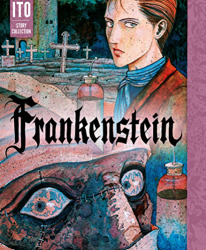
Props to the master of manga monsters for making the twist be that Victor is not secretly evil/insane.
Not only does Victor pity the creature and agree to create a mate for him—but he keeps his word! This is especially touching when you consider how the creature treks alllllll the way to Switzerland to dig up Justine’s head as a face for the bride. (Henry says he probably didn’t know it was Justines, but come on, you just happened to pick up the head of the girl you framed and carried it for miles across land and sea to deliver it to Victor instead of stopping somewhere closer? I don't buy it.)
Victor even goes the extra mile, kindly stating:
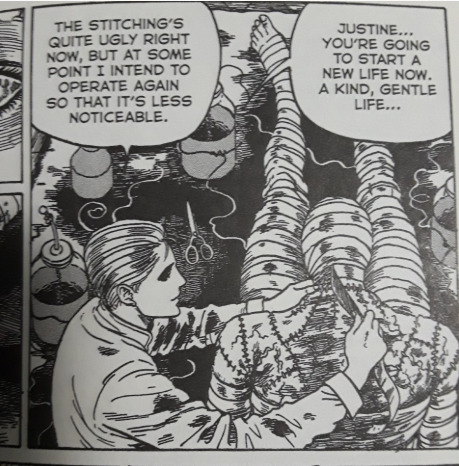
Yet the bride rejects the creature (not Victor’s fault) and in revenge, the creature kills Henry, Elizabeth, and Alphonse. In retaliation, Victor follows him onto the ice and relates his tale to Walton before dying.
Victor's actions are nothing heroic, but what more could he have done? He didn’t break his promise and kill the bride like in the original novel and he clearly cared about reanimating “Justine” as shown in the above image.
And did I mention this manga was done by Junji Ito? Would YOU stay in the same room if you created a Junji Ito monster? Didn't think so! After the initial mistake of abandoning his monster, this Victor did the best he could to make amends and protect his family--making him an overall good person.
Decent guy
This Dark endeavor by Kenneth Oppel: 7/10

Serving as a prequel to the original novel, This Dark Endeavor tells the untold story of what leads young Victor Frankenstein to create his monster.
While Victor very much struggles with his angsty dark desires (bad), he tirelessly searches for the alchemic "Elixir of Life" to save his twin brother (good). A brother who is more talented than Victor, has the heart of his love interest, and Victor believes everyone prefers over himself.
Good on you, Victor, for letting the love for your brother override understandable sibling jealousy. If that wasn’t enough to make him decent, letting a few fingers be cut off to save his twin definitely does.
What brings Victor down to a 7 is his relationship with Elizabeth. It’s born out of jealousy from her loving his twin rather than genuine affection. Even if this retelling makes Elizabeth a feisty, pants-wearing independent female (to lessen the possessive undertones Victor exhibits, I presume? Read it and judge for yourself), the relationship does nothing positive for his character. Tricking someone into kissing you is a jerk move, bro.
Ok I guess….
Such Wicked Intent by Kenneth Oppel 6/10
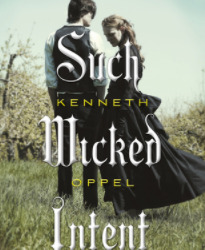
The sequel to This Dark Endeavor loses Victor’s careful balance of good and bad traits its predecessor boasted. Victor wasn’t perfect in TDE, but the majority of his negative actions stemmed from trying to save his ill brother and were mostly forgivable. In Such Wicked Intent, his understandable sibling jealously now comes off as petty since Victor’s twin is already dead.
Victor trying to bring his brother back to life (good) is undermined by his growing reliance on supernatural butterflies that increase his abilities despite other characters pointing out the obvious danger. Victor is also not the greatest parent to Twin 2.0 and the previous issues with him and Elizabeth from book 1 don’t improve. He’s the same Victor from TDE, but the plot focusing on his selfish desires makes him more flawed as a result.
Frankenstein by Mary Shelley (the original novel): 6/10
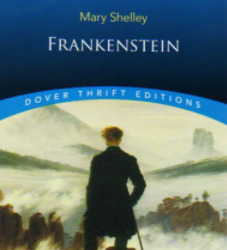
Depending on how you interpret the events of the original novel, Victor is either a college Dad in over his head and trying his best after an initial mistake, or a misogynistic, irresponsible jerk only capable of thinking of himself. There are enough professional articles to support both interpretations, and I’m not the person to pick one over the other.
However, if the narrative he tells Walton is to be taken as truth (and the creature not correcting Victor's account tells me it is), Victor spent most of the novel trying to fix his mistake (intentions may vary)—and isn’t too bad as a result.
Pride and Prometheus by John Kessel: 5/10
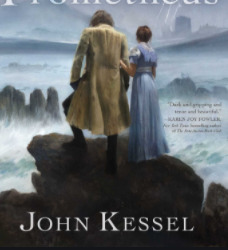
Despite being a crossover with Pride and Prejudice, Kessel tries to be as faithful to the original Frankenstein as possible. However, the few changes he makes hurts Victor from a moral standpoint.
Victor’s not the greatest guy when handling the romantic gestures of both Mary Bennet and Henry. Also, murdering his creature's mate with poison right before they leave to start their happily ever after is awful, but understandable from his point of view.
Then there's P&P's ending, where Walton describes meeting Victor on the ice. It’s revealed that Victor left killing the creature's mate and the Bennet’s out of his narrative. While this is probably Kessel justifying why Jane Austen’s characters and his changes weren’t mentioned in the original text (and who can blame him?) it does make Victor a liar. In the original, the creature never called Victor out for omitting anything—so altering the story on his deathbed places P&P’s Victor a rung lower than his original counterpart.
Ehh….
Frankenstein According to Spike Milligan: 4/10
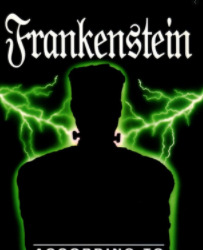
As a nearly-word-for-word retelling with minor, humorous changes by the comedian Spike Milligan, Victor is more pathetic than anything. He’s a harmless, pathetic, hilarious jerk.
Some quotes:
"I bounded along with feelings of unbridled joy and hilarity. From a great distance my family could see me bounding with unbridled joy and hilarity." (53)
*
"'I tell you,’ I said, ‘that murderer had his trousers down, was eating fish paste sandwiches and traveling 100 miles per hour.’" (59)
*
"‘I can offer you no consolation,’ said he.
‘Then piss off.’ said I." (54)
Here’s his jail visit with Justine in animatic form (and me shamelessly plugging my other creative endeavors)
Monster by Neal Bell 3.5/10
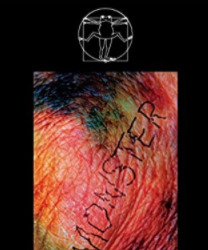
Warning: contains mentions of animal abuse
On one hand, Victor wants to conquer death to save his family and is clearly disturbed over Justine's and his mother’s death. However, the man expresses little concern at the possibility of William getting struck by lightning with his kite in front of his mother who had already lost 9 children.
He can also talk to dogs and cats (for…some reason?) who are portrayed as intelligent beings with feelings—yet that doesn’t stop him from eating said dogs in the Arctic and killing said cat after threatening her with a knife. He also flings around Bible verses while being painfully egotistical about “being God”.
Using Henry’s romantic affections toward him to his advantage, briefly forcing himself on Elizabeth, and tenderly caring for his monster only to abandon him after the creature expresses a want to die just makes him an awful person all around. The fact he doesn’t do these things with clear malicious intent saves him from being any lower.
Quotes:
ELIZABETH: A bone. A brittle bit of skin. A tooth—
VICTOR: Would you not be womanish now?
Be useful. Here—hold the Leyden jar,
While I attach the string…
*
VICTOR: A satisfactory morning, then, Mister Puss—tormenting the dogs?
CAT: God gave me a duty. I fulfill it.
VICTOR: Papa says there is no God.
(He takes out a knife)
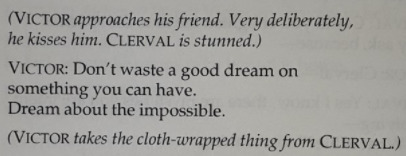
Pretty bad dude
WARNING: Please note that some of these Victors get into unsavory territory. If the mention of sexual themes/abuse/murder bothers you turn back:
The Casebook of Victor Frankenstein by Peter Ackroyd: 3/10
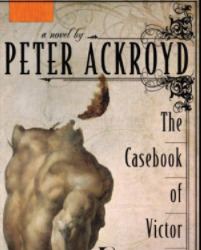
This one was tricky. The narrative chugs along with Victor being an intelligent, thoughtful guy with only a few obsessive tendencies. He’s chilling with the Shelleys, talking to the poor in the streets and financially supporting Fred’s family along with giving out generous tips. He’s a cool guy. He’s a great dude! He’s….revealed in the final 2 pages to be recounting everything from a mental asylum, the monster was in his head, and he’s actually the one that committed the murders.
Alrighty then. ¯\_(ツ)_/¯
Having his insanity revealed in the final pages, it’s hard to judge whether there was genuine malicious intent or if Victor truly thought he created the creature and believed he was doing good in trying to “stop” it. No matter his intentions though, the body count remains and a child strangler has no place being anything higher than a 3.
The Dark Descent of Elizabeth Frankenstein by Kiersten White: 1/10
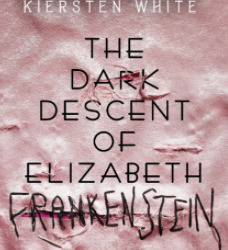
We all knew this one would make the list. Elizabeth’s first flashback sets up Victor as having serious issues—the question becomes how low will he go? Turns out pretty low.
He’s the one who killed William and framed Justine along with murdering his father, brother Robert and various people at Ingolstadt.
What really makes him despicable is that Elizabeth is the novel's main POV character who only sticks with Victor so she’s not thrown out on the streets. He’s abusive, controlling, dominating, and so possessive that he’ll perfect reanimation so that not even death can take her away from him! Yikes. I can’t stress enough how being in Elizabeth’s POV makes these actions all the more menacing.
Quote:
“There was never another path for you. Consider how much worse it has all been for me. How much I have had to suffer. And how much of that suffering has been caused directly by you!” His face twitched, and his fingers tightened on the pistol. Then he sighed. “It does not do to dwell on it. There is no point in fighting. This is your fate, Elizabeth Frankenstein. I will let no other claim you—not man, not death, not even God.” (279)
Nice guy.
Despite his terrible actions, Victor is trying to "save" Elizabeth from death. In his mind, he wants what’s best for her. It’s a crazy mind that mixed up domination and love, but the fact that his evil actions come from wanting to keep someone he wants to control cares about safe vs. other versions where his crimes stem from wanting to rival god and rule the world, this version isn’t THAT bad. At least his hearts in the right place—even if his mentality is utter garbage.
The Memoirs of Elizabeth Frankenstein by Theodore Roszak 0/10
*insert my screams of insurmountable anguish here*

Caroline: Hey son, you should do NSFW things.
Victor: Sure. I will now do NSFW things.
Victor: *proceeds to do NSFW things*
The reprint of this novel mentions on the cover it’s erotica, but the copy I bought (and to this day have not finished) had no such disclaimer. I’ll break my rule and speak on the quality of this book: there is none. For an alleged “pro-feminism” novel everyone is terrible—and Victor is no exception.
Literally Satan.
Dean Koontz’s Frankenstein Series: -∞/10
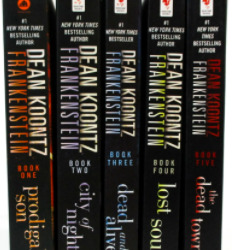
So you’ve read far enough to join me in Hell.
Where do even I start? This is a Victor who extended his life to the present day. Who worked with Hitler, Stalin, Castro and regretted the fall of the Third Reich. Who created an army of emotionally deprived “new race” creations to kill people and assume their identities so he could ascend the ranks of politics. Who, once he has enough of his new race integrated into society, desires to commit mass genocide on humanity and establish himself as supreme ruler of the world—only then can he conquer the cosmos as well because why the hell not?
Oh, and he’s a wife-beater/murderer too! Which isn’t a problem, considering he can create a new wife whenever he sees fit (he was on Erika 5 by book 3). The sheer lack of any positive traits in this man is laughable. Koontz really, REALLY wants to get across that Victor is a bad guy.
And if you’re somehow not convinced by the above description, here are some quotes I pulled from the first 3 novels as a bonus to reeeeeally sell how despicable this clown is:
Regarding Elizabeth:
“Victor had not loved Elizabeth. Love and God were myths he rejected with equal contempt. But Elizabeth had belonged to him. Even after more than 200 years, he still bitterly resented the loss of her, as he would have resented losing an exquisite antique porcelain vase if [his creature] had smashed that instead of the bride,” (3.97).
Regarding Mary Shelley:
“When Mary Shelley took a local legend based on truth and crafted fiction from it, she made Victor a tragic figure and killed him off. He understood her dramatic purpose for giving him a death scene, but he loathed her for portraying him as tragic and as a failure. Her judgment of his work was arrogant. What else of consequence did she ever write? And of the two, who was dead—and who was not?” (1.79-80)
(Author Note: For your information, Victor, The Last Man is considered by some to be the first dystopian novel)
His…ah…"friends”:
“Fire was featured in some of his less pleasant memories. The great windmill. The bombing of Dresden. The Israeli Mossad attack on the secret Venezuelan research complex that he had shared with Mengele in the years after World War Two. Nevertheless, he liked to read to the accompaniment of a cozy crackling fire,” (1.76).
*
“Victor admired Hitler. The Führer knew talent when he saw it.
In the 1930s and 40s, Victor had worked with Mengele and others in Hitler's privileged scientific class. He made considerable progress in his work before the regrettable allied victory…the problem with the Führer had been that his roots were in art and politics…The future did not belong either to artists or to politicians,” (2.24-25).
Dat ego tho:
“When I die, those cells will be capped descend a signal that will be relayed by satellite to everyone made of new race flesh, to every meat machine that walks. And you will fall down dead,’…Victor smiled, anticipating triumph in spite of their silence. ‘Did you think a God would die alone?’” (3.345).
*
Civilization would not be remade or sustained by Christianity or by Islam. Neither by Scientologists nor by the bright-eyed adherence of the deliciously solipsistic paranoid new religion encouraged by The Da Vinci Code. Tomorrow belonged to scientism. The priests of scientism were not merely robed clerics performing rituals, they were gods, with the power of gods. Victor himself was their Messiah,” (2.25).
*
“With Victor's unstoppable drive for power, with his singular intellect, with his cold materialism and his ruthless practicality, and now with synchronicity on his side, he had become untouchable, immortal.
He was immortal,” (3.329).
*
“How they goggled at him, abashed by his wisdom and knowledge, mortified by their ignorance, over-awed by his godlike power,” (3.330).
*
“’Murder,’ said the caller. ‘murder…excites me.’
Victor kept the growing concern out of his voice. ‘No, your mind is fine. I don't make mistakes.’” (1.156)
Oh yeah, he has a wife, doesn't he:
“This is why Victor requires …the cruel humiliation of his partner. He has long ago transcended the guilt that committing acts of cruelty might spawn in others...the exercise of raw power thrills him,” (1.244).
*
“I have given you a life…remember that. I have given you a life, and I will choose what you do with it,” (1.464).
Wives view of him:
“She owned literally hundreds of outfits. Having been created to his ideal measurements, Victor had purchased everything…She hoped that someday she would be allowed to shop for herself. When Victor allowed that, she would know she had at last met his standards and earned his trust. Briefly, she wondered what it would be like not to care what Victor—or anyone—thought of her. To be herself. Independent. Those were dangerous thoughts. She must repress them.” (1.107)
*
And those are just the PG bits, he does much, much worse.
*
In conclusion:
So yes, Spike Milligan made Victor a pathetic jerk, Casebook made Victor a madman, Memoirs made him an erotic predator, Dark Descent had him as an abusive boyfriend ruthless in possessing “his Elizabeth”, but nearly succeeding at worldwide genocide while abusing/murdering/manipulating people to achieve his goals makes Dean Koontz’s Victor Frankenstein the worse, more morally despicable Victor Frankenstein of them all. At least from what I’ve read.
Annnnd that’s it! If you want me to make a part 2 and add in the films/plays let me know! Hopefully at least one of these peeked your interest as something to check out during spooky season.
Shameless plug-in: here’s my own Frankenstein adaptation
*
Bonus!
Ranking the books on how much I liked them personally!
Great:
The Dark Descent of Elizabeth Frankenstein: Nice to see Victor’s villainy stem from family relations and not ego and wanting to defy God for a change.
Junji Ito’s Frankenstein: Phenomenal artwork, fairly faithful adaptation, and the changes serve to put Victor in a better light—which I love! The master of manga monsters himself made the right choice in keeping the creature more monstrous in this version instead of focusing on his humanity.
This Dark Endeavor: Frankenstein characters go on a Harry Potter styled adventure. Need I say more?
Average:
Such Wicked Intent: Victor’s character takes a dip, and pit monsters/life-absorbing butterflies don’t quite fit in a Frankenstein prequel.
Frankenstein According to Spike Milligan: It’s a silly, stupid comedy. Got a few chuckles out of me.
Pride and Prometheus: The concept works way better than it should. However, it follows the original text to a fault and can be boring at points.
Bad:
Warning: contains mentions of suicide
Monster: Victor’s character was far too inconsistent to be likable. He can talk to animals why, exactly?
Casebook of Victor Frankenstein: So, Victor is revealed to be crazy in the final 3 pages? So, the monster was in his head? Alright. But other characters throughout the book SAW the monster and described him like Victor did. So, there’s no way to separate Victor’s POV from reality and that kills the reread value and makes this a waste of time. Don’t get me wrong, the creature being symbolic for Victor’s inner demons is a fascinating direction if done well—and I recommend the essay “Frankenstein: The Man and the Monster” by Arthur Belefant if you want a much shorter exploration of this concept. It’s not perfect, but beats Casebook by a longshot!
Also, taking the real-life suicide of Percy’s wife Harriet and turning it into Victor murdering her and framing it on someone else to mimic Frankenstein’s Justine/William scene is just wrong. You made a woman’s suicide a cheap plot point in your fanfic of the mistress’s novel. That is what you did, author.
Dean Koontz Frankenstein: It starts out good and has great suspense—too bad the actual plot is awful. Victor’s so painfully evil it comes off as comical, the characters are bad/bland, plot holes abound (they state Mary Shelley’s novel is canon, then mention the windmill which was only in the films—so who even IS this Victor? Book or film?). The conclusion in book 3 is one of the most underwhelming finals I’ve ever read, and the creature “cures” a kid of Autism in the final chapter. No really. How this is a book series/comic series/movie is beyond me.
So atrocious I couldn’t bring myself to finish:
Warning: contains mentions of sexual themes
The Memoirs of Elizabeth Frankenstein: It claims to be pro-feminist, but the women “good guys” blatantly state they are grooming children for sexual rituals and Victor and Elizabeth are coerced into doing NSFW things by Victor’s mother in the name of “women’s rights”. Here’s the kicker: these awful actions are framed as being positive. I—a woman—loath this novel. Maybe things got better by the end (and if there was some plot twist that changed the entire setup, I apologize for ranting about nothing) but I’m not reading to that point to find out! This will forever stay both my first and last experience with erotic literature. Thank goodness The Dark Descent of Elizabeth Frankenstein exists to give us a decent feminist take on Frankenstein!
#THIS TOOK OVER 5 YEARS AND I'M FINALLY DONE!#victor frankenstein#frankenstein#halloween#gothic literature#classic literature#frankenstein adaptations#frankenstien au#frankenstein memes#the casebook of victor frankenstein#the dark descent of elizabeth frankenstein#frankenstein according to spike milligan#dean koontz frankenstein#Monster neal bell#this dark endeavor#such wicked intent#pride and prometheus#charlemagne1
117 notes
·
View notes
Text
Birds of Prey

I loved it! This movie continues the fun, bright direction for this universe while bringing something entirely new to comic book-based films.
[Spoilers for Birds of Prey below]
Birds of Prey (and the Fantabulous Emancipation of One Harley Quinn) is FUN. I know literally every review for this film uses that word, but after watching the movie a couple of times that is the word that stays with you through most every scene. Unlike Suicide Squad, BoP keeps all the promises made by the trailer and more. Cathy Yan and Christina Hodson help bring some of the most important characters in comics to life in a pulsating film about orphans overcoming misogyny.

I have waited for this film ever since I first saw Harley Quinn in Suicide Squad.
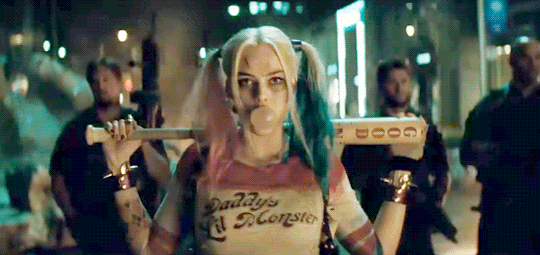
Suicide Squad failed to translate what made the comic book team so compelling, and insisted on shipping Harley with an abusive psychopath. (I still can’t believe Ayer had Margot Robbie unironically say the line ‘Normal’s just a setting n a dryer.’ Ugh) I remember feeling betrayed when the film ended with her and the Joker riding off into the sunset. Despite all this, Robbie had obviously done her research and was able to bring a charismatic distillation of New 52 Harley to the big screen.
Then, the WB announced that along with their planned Gotham City Sirens film there would be a romantic film about The Joker and Harley, which sounded horrible and cliche. Luckily, Suicide Squad was critically-panned and Wonder Woman was the first clear-cut success for the DCEU (Sorry Snyder diehards.) WW proved that nearly everyone would go to the theater to watch a superhero film that was not only centered around a woman, but was directed by one as well. Ultimately, this film is what happens when R-rated and female-led films are proven to be successful. Yan and Hodson had nothing to prove, but they definitely proved that they could create a team of women who everyone could relate to.
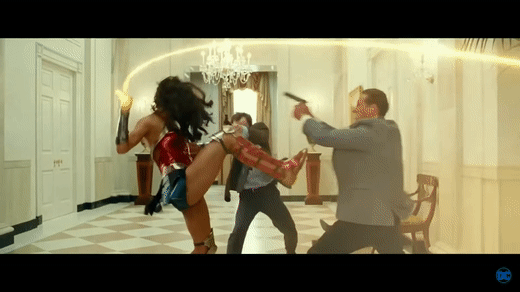
Robbie was able to help convince the studio that the Birds of Prey was the right direction to take the franchise in. This way she could use the notoriety and appeal of Harley Quinn to shine a light on lesser known characters. Through the narration device we have Quinn literally introducing us to lesser known DC characters like Renee Montoya and Cassandra Cain.
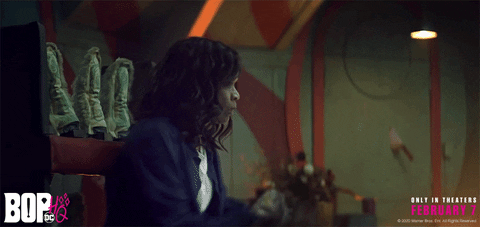
Renee Montoya was created for Batman: The Animated Series, just like Harley Quinn. Unlike Harley it took a bit for Montoya’s character to be developed once she was introduced in the comics. In Gotham Central we got to see more of Renee’s life as a queer, Latina woman in law enforcement. Later in 52 we saw her recovering from the trauma of being framed and publicly outed, and then beginning her journey to becoming a vigilante.
In BoP, Renee Montoya is still a badass, queer Latina woman. She has tried to work within the patriarchal, authoritative system for decades but she never got the credit she deserved. We see her journey from hard-drinking tough detective stereotype to member of the Birds of Prey. Rosie Perez is great and it is nice to see a woman that Hollywood might consider old getting to have action set pieces and be just as much a part of the team as the rest of the women.

Cassandra Cain (the Batgirl everyone forgets) is another character who deserves more recognition. A girl who was raised to be an assassin, but cannot bear to kill another human being. She does not speak and can only communicate through body language.
Cassandra Cain is a completely different character. She is not a trained assassin, she is more a Jason Todd or Mia Dearden analog for Harley: an abandoned child doing what they have to in order to survive. Ella Jay Bosco is fantastic and this interpretation of the character would not work if Bosco’s comedic timing were not as good as it is. She and Robbie bounce off of each other perfectly.

Margot Robbie as Harley Quinn is just as incredible as you expect her to be. She is obviously great with the slapstick comedy that Harley is known for, but the emotion is always there on her face, ready to bubble to the surface. I wish the film focused less on her relationship with the clown, but it does allow Robbie to play with a heartbroken Harley, a woman trying so hard to hide the pain in her life behind a painted smile. (Please stop calling her the female Deadpool, She-Hulk smashed the fourth wall first and better anyway.)

Helena is the woman who is least served by the story, but there isn’t much to her character. I understand that it is part of her that she has no social skills and has been singularly focused since she was a child. If this franchise continues it would be nice to see her grow beyond her need for vengeance. The role really only works because Mary Elizabeth Winstead brings her wry smirk and deadpan performance to the role.
Ewan McGregor and Chris Messina are also excellent in the roles they are given. The characters are obviously queer-coded, being just as campy and fun as the rest of the film, but their role in the film is mostly to personify the toxicity and abuses of power that have hurt these women in the past.

Dinah is the one of the only characters aside from Harley that gets explored through the narrative and not by the narration alone. Through Montoya we learn that, like in the early comics, Dinah’s mother (presumably Dinah Drake) was a vigilante whose death caused Dinah to lose faith in the kindness of the world. I’ve already discussed Dinah’s difficult journey to the big screen. This Black Canary is a songstress and fighter, we see that Dinah is willing to work for Roman and keep her head down, until she sees women being assaulted. As jaded as she appears she is always ready to throw down to protect those around her, and is ready to open her heart to other people, especially Helena. Jurnee is incredible at delivering emotion one second, and then a great comedic line less than one minute later. Her ability to emote is exceptional, every look Dinah gives is filled with clear emotion and meaning.
The action in this film is also grounded and dynamic. The action scenes are less influenced by previous superhero films, but by John Wick, even going so far as to bring in the film’s director to punch up the fighting sequences. Each woman has their own style, and to praise Robbie once again, she obviously trained and performed many of the Harley choreography.
Birds of Prey is beautiful, fun, powerful and exactly the kind of film DC should be making.
[P.S. I could not stop listening to the amazing soundtrack while writing this.]
#birds of prey#harley quinn#black canary#dinah laurel lance#huntress#helena bertinelli#batgirl#cassandra cain#renee montoya#black mask#victor zsasz#margot robbie#jurnee smollett bell#mary elizabeth winstead#rosie perez#ewan mcgregor#chris messina#cathy yan#christina hodson#dc comics#gail simone#paul dini#dcau#wonder woman#dceu#queer
89 notes
·
View notes
Text
Cottagecore Films (pt. 10)

Elizabeth (1998)
TW: blood, mild gore, torture
starring Cate Blanchett, Christopher Eccleston, Geoffrey Rush, Joseph Fiennes, Daniel Craig, Richard Attenborough
This dramatic retelling of the early years of Queen Elizabeth I’s reign over England opens at the death of Catholic Queen Mary in 1558, whose demise brings her half-sister Elizabeth to the forefront. Elizabeth must battle the unforgiving French abroad, dangerous conspirators at home, and at times even her own advisors as they push their agenda onto the young queen. As she grows in experience, Elizabeth learns to put her own needs before the mischief of the court and the confusion of unbalanced alliances, declares her undying love for her people, and establishes herself as one of England’s strongest rulers to date.
I really enjoyed the strength and grace carried by the entire film. Overall, the film maintained an air of dramatic tension, but never felt as though it strayed from the truth of Elizabeth’s story. I do think that, at times, the film felt perhaps too historical though, like a documentary. At moments of high stress, such as assassination attempts or uncovering the conspirators, the film felt a little too factual instead of emotional. It continued the same tone and level of emotion throughout, instead of raising it and lowering it with each scene. That said, Blanchett performed impeccably as Elizabeth, bearing the dignity of a monarch so fluidly you might think she truly was one. Every emotional response was executed so fully that it was as if the audience was given a real look into her life, rather than watching a mere biography. Even though many of the actors in this film are well-loved, I feel like the film could have done more with them at times. Eccleston played a manipulative villain who truly believed he had the best intentions for his country, but he was given far less screen time than he deserved. I would have loved a deeper insight into the complexity of this character, which Eccleston tried to deliver fully in every scene, but there simply wasn’t enough time with him. Similarly, Craig was on screen for mere moments at a time, with few to no lines, yet the audience was expected to fear him and worry for Elizabeth’s safety. Craig’s character was truly menacing, namely in the scene where he walks down the hall in the dark with his robes billowing, but we saw so little of him that he felt almost insignificant to the overall story. The film was over two hours, but with this cast I would have loved to see a limited series or something of that nature, just to provide more depth to the story. As a side note, I don’t know how historically accurate this film was, so I’m not going to comment extensively on that. If that was something you were looking for, you won’t find it here. 7/10

Pan’s Labyrinth (2006)
TW: blood, gore, fascism, war
starring Ivana Baquero, Maribel Verdú, Sergi López, Doug Jones, Ariadna Gil, Álex Angulo
Ofelia, a young girl caught between her love of fantasy and the horrors of fascism surrounding her, finds herself pulled into a mysterious world after she meets a Faun in a nearby haunting labyrinth. The Faun orders her to complete three tasks to prove that her soul is unchanged and that she remains the true princess of the Underworld. As she struggles to complete these tasks, Ofelia’s life is threatened on many occasions, both from the fantastical world of the Faun and the human world she’s forced to remain in. Horror and death strike as her home falls to the revolution, and they quickly catch up with her, even as she strives to protect the life of her newborn brother and understand who she is truly meant to be.
This was an absolutely fascinating film. The settings alone were absolutely haunting, from the camp to the woods to the labyrinth, but most especially the Pale Man’s table. The attention to detail at every point brought this story to life, and truly filled you with constant dread. The way the Captain carried himself, the pile of worn-down shoes in the corner, the pomegranate on the Pale Man’s table, the microexpressions on every character’s face, Ofelia’s green dress (reminiscent of Alice in Wonderland, especially within the context of the scene)... Every small detail contributed to the story, even when they aren’t actively moving the plot along. There was never a moment for the audience to feel relief or victory, even as Ofelia overcame trial after trial. I spent the entire film waiting for the next terrible thing to happen, but instead of being exhausting like other movies, this one has me thinking about it nonstop. I watched it the day before writing this, and I can only think of watching it again. I feel like it demands a second viewing to truly understand it, which is a marvelously rare feeling for me. The acting is also truly exceptional. Child actors tend to struggle with conveying complex emotion on screen, but Baquero conducted herself with the grace and skill of any experienced adult. She pulled at the childlike wonder in me, but still grounded my adult side with her gravity. Ofelia carried the burden of trauma, but never relinquished the belief in something more; Baquero conveyed that in a most excellent fashion. All of the actors were phenomenal, but Baquero outshone them. Also a brief aside: Jones was incredible as the Faun and the Pale Man. I’ve never felt so wildly uncomfortable or threatened as I did watching the Pale Man walk around. I hated it viscerally from an emotional standpoint, but from the film and acting perspectives, Jones created something mind-blowing. I definitely had to be mentally and emotionally prepared to watch this film, but it truly was a masterpiece. 10/10

The Garden of Words (2013)
starring Irino Miyu, Hanazawa Kana
Rainy days bring lonesome highschooler, Akizuki Takao, and struggling adult, Yukino Yukari, together at the Shinjuku Gyoen National Garden. Takao shares his dreams of becoming a shoemaker, but Yukari says very little about herself, instead focusing on supporting Takao’s goals. When the rainy season ends, the two don’t see each other for the rest of the summer. When school resumes, Takao accidentally learns a devastating truth about Yukari, but it doesn’t change the way he feels about her. His naive love, however, changes everything.
I greatly enjoyed the aesthetic of this film. It took place mostly in the beautiful gardens, with artistic emphasis on the water, trees, and plants that surround the character. It was truly beautiful to look at, and really serves to push the audience toward visiting the actual garden as well. The artists also focused in great detail on the small movements of the characters; each emotional change was reflected in their movements, which you don’t often see done so gently in any realm of animation. The whole film felt incredibly soft and touching, and truly brought to life the small moments that make living so special. Despite the artistic aspect being so beautifully done, I felt the story to be a bit lacking. While I enjoyed Takao’s story, and much of his process was befitting of a 15 year old boy, I felt that he could’ve been given more depth. Basically all of his potential for personality was crammed into the last five minutes, and what we got was beautiful. I definitely felt that the movie could have been longer than 45 minutes to accommodate this character expansion. The same can be said for Yukari. Her twist was monumental to the plot, but we didn’t get to see what the real impact of it was. She says throughout the film that she has to learn how to walk again, and we learn that she has some kind of physical disorder, but we never learn what that is and how it ties into her mental health, which seems to be addressed as an entirely separate point. We got several scenes of her alone, so even though Takao didn’t know much about her (which fit the story well), the audience certainly would have benefitted from learning more about her character, especially for the climactic end scene. Lastly, their relationship was kind of natural, if uncomfortable, at first--it makes sense for Takao, a young impressionable teenager, to fall in love with an older woman--but then it takes a turn for the hugely unhealthy--Yukari puts the burden of her own mental health on the shoulders of a boy--and this is implied to be okay. The film didn’t outright condone it, but it also didn’t condemn the potentially toxic dynamic. I wouldn’t say it was a pedophilic relationship by any means, but it was definitely unhealthy at its core; you could see hints of it over the course of the film, even though the story maintained its innocence. It’s definitely playing with fire though. 6/10
Part One // Part Two // Part Three // Part Four // Part Five // Part Six // Part Seven // Part Eight // Part Nine
#cottagecore#gardencore#naturecore#flowercore#cozycore#horror movie#horror film#historical drama#period drama#film#film review#movie review#movies#spanish film#british film#japanese film#anime#activities#mine
21 notes
·
View notes
Text
Martha Plimpton Moves On (Again)
New Post has been published on https://kidsviral.info/martha-plimpton-moves-on-again/
Martha Plimpton Moves On (Again)
In the course of nearly 35 years as a professional actress, the Raising Hope star has had only one steady job — and it just ended. But if there’s anything Plimpton’s illustrious, challenging career has taught her, it’s that nothing lasts, and that this is OK. And that it’s boring to still be talking about The Goonies.
View this image ›
Photograph by Ramona Rosales for BuzzFeed
”Our lives as actors are so peripatetic. We’re always all over the place, and we never know where we’re going to be next. That period of intimacy you create when you’re working on something is so important, and so vital. It’s what everything springs out of — that trust, and that mutual respect. And it makes you grateful that you do this. Do you know what I mean?”
In someone who articulates her thoughts in well-contemplated sentences and paragraphs, and who magnifies her decisive ideas with an extensive vocabulary, Martha Plimpton’s conversational tic — do you know what I mean? — begins to feel ironic after a while. Because it is impossible not to know what she means.
There are performers — not necessarily the movie stars, but the actors — who become unknowing touchstones of our lives because we grow up with and live alongside them: Plimpton is one of those. At 43, she has been famous, or at least recognizable, for more than 30 years, having been acting professionally since 1980. Her range is vast: She’s excelled in classic stage roles and broad TV comedy. Despite all the perils that haunt kid stars, not to mention women in entertainment who dare age, she has created a place for herself in which she is both professionally prolific and a real person. From the consumed way she sounds when she’s talking about her work, she appears not to have lost her passion for it — nor has she lost her patience or her nerve.
Along the way, Plimpton has been nominated for three Tony Awards and three Emmys (winning once, for Best Guest Actress in a Drama in 2011, for her portrayal of Patti Nyholm, a maddening, occasional courtroom foil for Julianna Margulies’ Alicia on The Good Wife). She has been in more than 20 movies, both big and mainstream (The Goonies, Parenthood) and indie (I Shot Andy Warhol, Eye of God). She’s currently appearing as the trenchant, broken-hearted Brooke in Jon Robin Baitz’s Other Desert Cities at the Old Vic in London. Activism is a big part of her life as well: She co-founded the abortion rights-focused organization A Is For, and especially on the subject of abortion and lefty politics, she is a scathingly proficient user of the Twitter megaphone.
View this image ›
Plimpton as Virginia Chance on Fox’s Raising Hope. John P. Fleenor / FOX
On Friday, Plimpton’s most lasting role, as Virginia Chance on Fox’s underappreciated comedy Raising Hope, will come to an end after four seasons. The show has revolved around the working-class Chance family’s loving and insane efforts to raise little Hope, who was conceived during a one-night-stand Jimmy Chance (Lucas Neff) had with a hot serial killer who was then executed in prison. As Jimmy’s mother and Hope’s (young!) grandmother, Virginia has been the show’s almost-reasonable/also ludicrous heart. Her loving constancy with her husband, Burt (Garret Dillahunt), has provided the show’s screwball, Coen Brothers-like throughline.
Other than these four years on Raising Hope, Plimpton’s career has been defined by the transience of film, theater, and TV guest spots — and for now at least, she’s back to that more free, but less stable, way of life. She’s used to it. “It’s just part of the lesson of being an actor: Don’t hold on to things,” she said. “Just find a way to be good at letting go. Always, at all times.”
And about saying goodbye to Raising Hope and Virginia, she said: “There were things about doing that character every week — every day — that were incredibly freeing and confidence-building and gave me a new relationship to work, and how to work, and how to be present and available and game. I will miss it. But I cannot complain. I don’t feel in any way robbed of anything. Do you know what I mean?”
View this image ›
Photograph by Ramona Rosales for BuzzFeed
Plimpton’s mother, Shelley Plimpton, started out as an actor in New York City. She played Crissy in the original production of Hair, which is where she met Martha’s father, Keith Carradine, of the acting family of Carradines. Though Plimpton is close to her father now, Carradine was not around much during her childhood. She saw him “once a year for a few years there — when I was 6, 7, 8,” she said. “Most of my teens there wasn’t anything.”
“It’s not something I particularly like talking about,” Plimpton continued during our first interview, which was over a hurried lunch on a day when she was busy doing press for Raising Hope. “I don’t really feel like it’s anybody’s, you know, business. But of course, I love my father, I always have. He was a young man. And he had things to figure out.”
The Plimptons lived first in the Chelsea Hotel, and then settled on the Upper West Side (in an apartment Martha has lived in since — her mother eventually moved to the West Coast). In late 1970s New York, it was possible to be inventive, weird, and perhaps even poor in the city. “We did not have a lot of money,” Plimpton said. “I was raised by a sort of extended family of women — friends of my mother’s.” With her mother struggling as an actor, and then eventually tiring of the struggle and getting a 9-to-5 job, it was that network of friends who drew Plimpton into acting. “They were actors and artists and bohemians of varying stripes and colors and persuasions,” she said.
The writer/director/composer Elizabeth Swados was in this group, and she cast Plimpton first in a workshop, and then in a musical at the Public called The Haggadah. Or, as Plimpton put it, “Me and my blonde head did this musical about the Exodus.” (A young Julie Taymor, who would later direct The Lion King on Broadway, as well as the Spider-Man: Turn Off the Dark debacle, did the show’s puppets.)
View this image ›
youtube.com
The Haggadah led to more plays and workshops — and also to an attention-getting Calvin Klein commercial, one in a series of Richard Avedon-directed, up-close monologues that also featured Andie MacDowell and Shari Belafonte in separate ads. The commercials were more personality-driven than jeans-flaunting — each model was identified by first name by chyron, branding them. It was more innocent than the previous campaign starring Brooke Shields, also by Avedon, that featured the infamous slogan, “Nothing comes between me and my Calvins,” as intoned by the teenaged Shields, posed in full jailbait lure.
At age 11, Plimpton, a spiky-haired, New York-accented tomboy, was Shields’ opposite. And while happily thinking about that curious turn in her career as she drank a glass of Sancerre at the Sunset Tower Hotel’s bar, she doesn’t look so different now. “I love those ads,” Plimpton said. “I love them. I mean, come on, fucking Dick Avedon shot those things.”
Recognition from the commercial got her first starring film role, playing a spiky-haired, Southern-accented tomboy named Jonsy — with Tommy Lee Jones as her father — in a small, sweet film called The River Rat. Jones wasn’t a movie star yet; he was known mostly for Coal Miner’s Daughter and a riveting, terrifying, and Emmy-winning performance as Gary Gilmore in the TV miniseries adaptation of Norman Mailer’s The Executioner’s Song. But he was as vivid a screen presence then as he is now, and the tween Plimpton managed both to match and warm him.
View this image ›
Plimpton with Tommy Lee Jones in The River Rat. Paramount/ Everett Collection
As for whether choosing acting was a conscious and active decision, or whether it just happened, Plimpton said, “I think it was a little bit of both.” Regardless, she continued to get cast: In the pre-Disney-Princess-addicted youth world, the tomboy archetype was a common one, and Plimpton’s tough kid exterior made her an inheritor of a pop culture legacy that included Scout Finch, Harriet the Spy, Peppermint Patty, and the young roles of Jodie Foster, Tatum O’Neal, and Kristy McNichol. The Goonies came next.
Plimpton called it “the experience of a lifetime,” and said she had “a great, amazing time making the movie.” She played Stef, the slightly nerdy girl who is actually cooler than anyone else in the movie. It was a big cast of kids, several of whom also had famous actor fathers (Sean Astin, Josh Brolin). Was that fun at the time — had she found her people?
View this image ›
Goonies Mary Evans/Ronald Grant/Everett Collection(
”I’ll put it to you this way: Teenage girls and teenage boys — no. You know? It’s not a good mix. I was, like, 13, 14. I was listening to Prince and Mozart on my headphones. I mean, I thought I was like — I was from New York. I thought I was smarter than everybody. You know? I think I just might have been just kind of an asshole. Do you know what I mean? And I know for sure that Corey Feldman was an asshole. I mean, he won’t mind me saying it: He was. A fucking asshole. We were children! And children are assholes. When they’re that age.”
After a few more questions about The Goonies, which has become a touchstone of ’80s nostalgia, she had enough, and made it clear, in no uncertain terms. “I’ve discussed it and talked about it and been interviewed about it so many times that I just kind of feel like there’s literally nothing new to say about it. Literally. Literally.” She was sort of laughing — and sort of not. Gesturing at her face, she said, “You’ll notice my eyes have sort of glazed over.”
But one parting shot: “I remember all of us making hardly any money off of it.”
When I talked to Garret Dillahunt, Plimpton’s Raising Hope co-star, about their working relationship and friendship, he said, “I never saw The Goonies. Which greatly pleased her.”
View this image ›
Photography by Ramona Rosales for BuzzFeed
Jon Robin Baitz offered Plimpton the Other Desert Cities role shortly after she finished filming Raising Hope’s fourth — and, now, final — season in January, and she jumped at it. Plimpton is the only American in the cast of a very American play that through a single wealthy family lays bare the trauma of the Vietnam War, the Reagan era, and the Sept. 11 attacks. Though she had been nervous about London audiences, both because of their known reserve and because of the content of the play itself. “These audiences are incredible,” she said when we spoke on the phone recently. “They’re so smart, and they’re so present, and they’re such enthusiastic theater-goers, that I have found the audiences actually extremely warm and extremely receptive.” And in the city itself, “Every shopkeeper calls you ‘darling,’ and everyone says ‘please’ and ‘thank you.’”
View this image ›
Martha Plimpton as Brooke, Clare Higgins as Silda in Other Desert Cities. Alastair Muir / Rex/REX USA
Other Desert Cities will run through May. If Fox had renewed Raising Hope, she would have returned to Los Angeles during the summer. That the show isn’t coming back is not a surprise — before the start of the season, Fox had moved it to Friday nights, which is often a death knell. “When you’re moving around so much on the schedule, I think it’s clear that there’s something not quite clicking for somebody, somewhere, I don’t know who,” Plimpton said. “The fact that they followed through with us regardless of that is pretty great of them. I feel like they did it really respectfully and really well, even though obviously if I ran a studio, we’d run for 20 years.”
Greg Garcia (My Name Is Earl, The Millers), the show’s creator who left before Raising Hope’s final season, has a different take on the experience. “I left for a lot of reasons, but certainly one of the reasons was I saw no support for the show on a studio or network level,” he said in a telephone interview. “It’s a shame. It’s a really good show. Had it been left in the same time slot from the beginning, had it gotten more support, I think it would have gotten a wider audience.”
About Plimpton, though, Garcia said, “I adore her. And I would jump at the chance of being on a set with her again.” He was originally looking at older actresses for Virginia — then he thought of Plimpton, citing 1996’s Beautiful Girls as one of his favorite movies. “Then I was, like, mad at myself,” he said. “Why was I not here earlier with this? I love Martha Plimpton, and she would kill at this role.”
Plimpton had done plenty of New York actor bill-paying guest roles, from an arc on ER to requisite appearances on various Law & Orders. She also had shot a pilot for Showtime with Matthew Perry in which she would have been a series regular, but it didn’t get picked up. When Raising Hope came along, she wasn’t actively pursuing a television gig as a goal, despite the financial rewards. “Because there’s so much rejection, and so much stress,” she said. “But I was definitely open to it, obviously.”
She thought the pilot script for Raising Hope was “hilarious,” and really liked Garcia. “He was, like, a really decent, swell, really smart, very talented guy,” she said. “I could just tell he wasn’t a Hollywood dickbag.” (Countered Garcia: “And I could tell right away that she wasn’t an actress ditzcunt.”)
View this image ›
Greg Gayne / FOX
Plimpton said Garcia made everything go smoothly during the audition process. “And that moment when you have to sign that contract during the test process — to, like, literally sign six years of your life away — it was easy for me for the first time,” she said. “And normally when you do that, it’s really terrifying. Because you don’t know how you’re going to be able to look at these awful people day in and day out.” She stopped, and laughed a loud laugh. “Do you know what I mean?”
Plimpton has been selective about her jobs because of the intimacy required in her work. And she is an intense and intimidating person to speak to whatever the circumstances — in our three conversations, I found her to be dryly funny and sharp as hell. She’s also surprisingly blunt: When we talked on the phone to catch up, her greeting was, “This article sure is taking a long time!”
She has clearly found community in her work, and at Raising Hope, camaraderie too. When I asked Dillahunt and Garcia — independently — what their preconceptions of Plimpton were based on what they had seen her do, both cited a line from The Mosquito Coast in which her character tells River Phoenix’s, “I think about you when I go to the bathroom.”
“I used to say all the time to people,” said Dillahunt. “Just because I thought it was hilarious if I said it. Never knowing that one day that sexy girl would be my wife.” Garcia couldn’t remember the exact quotation, but when reminded of the wording, said: “Yes! Yeah! Holy shit! She made me uncomfortable and made me have questions, and it’s all coming out of that little girl. Yeah!”
“How bizarre!” Plimpton said when I told her about their mutual fixation on that line. Do people say it to her often? “It’s not that common, but they will occasionally,” she said. “And I always find it kind of creepy and weird.”
View this image ›
Plimpton in The Coast of Utopia at Lincoln Center in 2007. Photograph by Paul Kolnik
Raising Hope gave Plimpton financial stability, getting her out of a debt she had accrued from years during which she worked almost solely in high profile, often Tony-nominated theatrical productions. After an ascendant career as a teenaged movie actor — she appeared in Peter Weir’s Mosquito Coast (1986), Sidney Lumet’s Running on Empty (1988), Woody Allen’s Another Woman (1988), and Ron Howard’s Parenthood (1989), among others — Plimpton hit what she called “a real big dry spell there for a long time.”
“My work in film was really sporadic: I never really, like, hit it,” she said. “There may have also been a period where I thought maybe I should be doing bigger roles than maybe I was ever going to get? And certainly my taste level is so high that I may have been too picky at times. And so I may have slowed myself down.”
Plimpton loves theater; it’s not an also-ran choice. “It’s not a process you get in any other medium,” she said. “And I love the collaboration, I love the rehearsal process, I love being in the room and working on a play. Working on the text, and excavating it. And laughing about it, and making mistakes.”
She paused. “It’s also true that there are just more interesting parts for women in the theater. There’s just more to do. I could play Hedda Gabler on stage, but no one will ever hire me to play Hedda Gabler in a movie. Do you know what I mean? Or a similar leading kind of role. There’s just more to sink my teeth into. I don’t have the face of a movie star. I have a face of a character actress. And there’s not that much character work for women. There just isn’t.”
Plimpton has played not only Hedda Gabler on stage (in a Steppenwolf production; she is a member of the company), but Imogen in Cymbeline, and Helena in A Midsummer Night’s Dream. Her Tony nominations have been for Top Girls, the revival of Pal Joey (she also sings), and for Tom Stoppard’s epic three-play cycle, The Coast of Utopia (about which she said, “I can’t think of a better experience.”).
That’s a small selection of her theater work; she has a remarkable resumé. An exhausting one, though. “I’d been working on stage — fortunately and luckily — kind of constantly. And I was finding myself physically wiped out,” she said about her pre-Raising Hope run. “And you couple that with the fact that you’re really not making any money, and you’re falling further and further behind in your bills — if you’re in the theater, and if you’re nominated for a Tony, you’d better hope someone’s going to help you pay for that stylist. Because it’s expensive to be nominated.”
Isn’t that infuriating, though? Never mind the discrepancy between studio-backed TV and film wages and theater salaries; accomplished working theater actors should be able to live in New York City, even in its current rich-person, Mike Bloombergian incarnation that’s so different from the 1970s Upper West Side of Plimpton’s childhood. “It’s everyone’s situation, it’s not unique to you,” she said. “There’s always someone working for less money than you in the theater. So if you’re going to bitch about the LORT contract” — the League of Resident Theatres’ minimum salaries — “then think about the guy working for $250 in some black box downtown. Or less. Or nothing.”
View this image ›
Phoenix and Plimpton in the film Running on Empty. Warner Bros. Pictures / Everett Collection
When you’ve been in the public eye for 33 years, starting from when you were a child — well, we all know what happens to a good number of those people. There’s an extensive record of things Plimpton has said to journalists over the years, but nothing especially humiliating. I reminded her that when she was a committed vegan, she was quoted saying she was “trying to get away from wool — the farming of sheep is very inhumane.” That was in 1990. “Yeah, yeah, come on. I was, like, 17!” Plimpton said, laughing.
Plimpton was also a focus of attention after River Phoenix, whom she had dated, died in 1993 at age 23 of a drug overdose. The two young, serious actors had met during The Mosquito Coast and also co-starred in Running on Empty. They broke up, from all reports, because of Phoenix’s substance use. After his memorial service, Plimpton spoke damningly of those who chose to mythologize his too-short life, and how he died. “I don’t want to be comforted by his death,” she told Tad Friend in Esquire, “I think it’s right that I’m angry about it, angry at the people who helped him stay sick, and angry at River.”
I asked her whether she ever thought about what she said then, and what that was like to experience in public. “I don’t talk about it anymore,” Plimpton said. “And I haven’t talked about it since then for a number of reasons. Chief among them is that if I did, that would be all anyone would ever say I had ever said about anything, ever. Do you know what I mean? I mean, literally, it would be as though we had never had this entire four-hour exchange.”
Explaining further, she said: “So that’s one reason why I don’t talk about it anymore. Because I have a rich and full life. I don’t need to repeat myself, and I certainly don’t need to alter the terms of how I felt at that time. Or explain myself, or justify it to anyone. So I prefer to just leave it be. And so far that’s worked for me!”
View this image ›
Photograph by Ramona Rosales for BuzzFeed
Plimpton’s friend Sarah Thyre, the writer with whom she co-founded A Is For (along with Lizz Winstead, the co-creator of The Daily Show, who is no longer with the group), described Plimpton as unwavering. “I question things, and then I proceed as if I didn’t have any doubts —because in my heart, I don’t,” said Thyre. “But Martha’s one of those people who just truly doesn’t question herself, and she just goes for it. I’m really, really proud to know her.”
Alarmed at the profound erosion of abortion rights, especially on a state-by-state level, they started A Is For in 2012. The nonprofit raises money, of course — general donations go to the Center for Reproductive Rights, and a January fundraiser in Los Angeles named “A Night of a Thousand Vaginas!” went to the Texas Abortion Fund. But beyond direct action, it’s a cultural shift Plimpton seeks.
When talking about a New York Magazine cover package about abortion published this past fall, Plimpton said she thought it was “great,” and that she was “encouraged by people’s willingness to speak,” but “there was a subtle sort of undertone of affliction to it.” She gathered steam, and spoke emphatically: “I’m looking forward to getting us to a place where this isn’t such a negative subject. Where we don’t assume that abortion has this sad, lonely, depressing feeling about it. Because for so many women, it’s the reason they are able to live. It gives women an opportunity, a chance, to participate. To go to school. To realize their dreams.”
As Thyre put it, “Martha really wants to change the way we talk about the ‘A’ word, and not have the definition and the driving form of the conversation come from the other side, which is how it’s been for many years.”
On Twitter, Plimpton often engages with people who disagree with her, whether the topic is those who blamed Philip Seymour Hoffman for his own death because he was an addict, Julianne Hough’s disastrous blackfaced Halloween costume, the Affordable Care Act, or, of course, abortion. Why does she endure the pain of going back and forth with people who are most likely crazy?
“I don’t want to automatically assume that someone’s an idiot just because they disagree with me,” she said. “They have to reveal their stupidity over time.” She does end up on rolls, though, when she’s arguing about inflammatory topics and simultaneously, as she calls it, “Blockin’ and rockin’.” Because the insults can be vicious, as anyone on Twitter knows. “It usually has to do with how ugly I am, and so I should shut up because I’m ugly,” she said. “Or I should have been aborted — because I’m ugly and stupid. And should shut up. Or that I’m a has-been — that’s always a fun one. That I’m a has-been who’s ugly and should shut up. ‘Ugly’ always makes its way in there. And I just don’t really want people who think that way to get away with it. I don’t think that that’s cool or OK. I don’t want it to work on me. And I don’t want it to work on other women.”
It’s not the way many — or any? — other celebrities act on social media, or in life. But Plimpton is different, and always has been.
“I’m a citizen and I’m a person,” she said, patiently describing something that should always be the case, but is actually rare. “And I don’t want my job or my career to get in the way of me being a citizen and a person.”
View this image ›
Photograph by Ramona Rosales for BuzzFeed
17.
Sign up for our BuzzReads email, and you’ll get our best feature stories every Sunday — plus other great stories from around the web!
buzzfeed.com
Read more: http://www.buzzfeed.com/kateaurthur/martha-plimpton-moves-on-again
0 notes
Text
Google Critic Ousted From Think Tank Funded by the Tech Giant
What would you do if you were the executive of a policy think tank that had received more than $21 million in donations from Google and one of your scholars posted on your website a statement praising a $2.7 billion fine against Google: (1) remove the post, (2) nothing, this is freedom of speech, (3) speak with the employees and ask them to notify you in advance the next time they did something like that, or (4) something else (if so, what?)? Why? What are the ethics underlying your decision?
In the hours after European antitrust regulators levied a record $2.7 billion fine against Google in late June, an influential Washington think tank learned what can happen when a tech giant that shapes public policy debates with its enormous wealth is criticized.
The New America Foundation has received more than $21 million from Google; its parent company’s executive chairman, Eric Schmidt; and his family’s foundation since the think tank’s founding in 1999. That money helped to establish New America as an elite voice in policy debates on the American left.
But not long after one of New America’s scholars posted a statement on the think tank’s website praising the European Union’s penalty against Google, Mr. Schmidt, who had chaired New America until 2016, communicated his displeasure with the statement to the group’s president, Anne-Marie Slaughter, according to the scholar.
The statement disappeared from New America’s website, only to be reposted without explanation a few hours later. But word of Mr. Schmidt’s displeasure rippled through New America, which employs more than 200 people, including dozens of researchers, writers and scholars, most of whom work in sleek Washington offices where the main conference room is called the “Eric Schmidt Ideas Lab.” The episode left some people concerned that Google intended to discontinue funding, while others worried whether the think tank could truly be independent if it had to worry about offending its donors.
Those worries seemed to be substantiated a couple of days later, when Ms. Slaughter summoned the scholar who wrote the critical statement, Barry Lynn, to her office. He ran a New America initiative called Open Markets that has led a growing chorus of liberal criticism of the market dominance of telecom and tech giants, including Google, which is now part of a larger corporate entity known as Alphabet, for which Mr. Schmidt serves as executive chairman.
Ms. Slaughter told Mr. Lynn that “the time has come for Open Markets and New America to part ways,” according to an email from Ms. Slaughter to Mr. Lynn. The email suggested that the entire Open Markets team — nearly 10 full-time employees and unpaid fellows — would be exiled from New America.
While she asserted in the email, which was reviewed by The New York Times, that the decision was “in no way based on the content of your work,” Ms. Slaughter accused Mr. Lynn of “imperiling the institution as a whole.”
Mr. Lynn, in an interview, charged that Ms. Slaughter caved to pressure from Mr. Schmidt and Google, and, in so doing, set the desires of a donor over the think tank’s intellectual integrity.
“Google is very aggressive in throwing its money around Washington and Brussels, and then pulling the strings,” Mr. Lynn said. “People are so afraid of Google now.”
Google rejected any suggestion that it played a role in New America’s split with Open Markets. Riva Sciuto, a Google spokeswoman, pointed out that the company supports a wide range of think tanks and other nonprofits focused on information access and internet regulation. “We don’t agree with every group 100 percent of the time, and while we sometimes respectfully disagree, we respect each group’s independence, personnel decisions and policy perspectives.”
New America’s executive vice president, Tyra Mariani, said it was “a mutual decision for Barry to spin out his Open Markets program,” and that the move was not in any way influenced by Google or Mr. Schmidt.
“New America financial supporters have no influence or control over the research design, methodology, analysis or findings of New America research projects, nor do they have influence or control over the content of educational programs and communications efforts,” Ms. Mariani said. She added that Mr. Lynn’s statement praising the European Union’s sanctions against Google had been temporarily removed from New America’s website because of “an unintentional internal issue” unrelated to Google or Mr. Schmidt.
Ms. Mariani and Ms. Sciuto said Google is continuing to fund New America.
It is difficult to overstate Mr. Lynn’s influence in raising concerns about the market dominance of Google, as well as of other tech companies such as Amazon and Facebook. His Open Markets initiative organized a 2016 conference at which a range of influential figures — including Senator Elizabeth Warren of Massachusetts — warned of damaging effects from market consolidation in tech.
In the run-up to that conference, Ms. Slaughter and New America’s lead fund-raiser in emails to Mr. Lynn indicated that Google was concerned that its positions were not going to be represented, and that it was not given advanced notice of the event.
“We are in the process of trying to expand our relationship with Google on some absolutely key points,” Ms. Slaughter wrote in an email to Mr. Lynn, urging him to “just THINK about how you are imperiling funding for others.”
Mr. Lynn is now in the process of starting a stand-alone nonprofit with the same team to continue Open Markets’s work. The new group, which does not yet have a name, has funding commitments, though clearly is not expecting any money from Google. It has launched a website called Citizens Against Monopoly that accuses Google of “trying to censor journalists and researchers who fight dangerous monopolies.” The website vows, “We are going to make sure Google doesn’t get away with this.”
After initially eschewing Washington public policy debates, which were seen in Silicon Valley as pay-to-play politics, Google has developed an influence operation that is arguably more muscular and sophisticated than that of any other American company. It spent $9.5 million on lobbying through the first half of this year — more than almost any other company. It helped organize conferences at which key regulators overseeing investigations into the company were presented with pro-Google arguments, sometimes without disclosure of Google’s role.
Among the most effective — if little examined — tools in Google’s public policy toolbox has been its funding of nonprofit groups from across the political spectrum. This year, it has donated to 170 such groups, according to Google’s voluntary disclosures on Google’s website. While Google does not indicate how much cash was donated, the number of beneficiaries has grown exponentially since it started disclosing its donations in 2010, when it gave to 45 groups.
Some tech lobbyists, think tank officials and scholars argue that the efforts help explain why Google has mostly avoided damaging regulatory and enforcement decisions in the United States of the sort levied by the European Union in late June.
But Google’s Washington alliances could be tested in the coming months. Google emerged as a flash point in the latest skirmish of the culture wars this month after one of its male engineers posted a critique of the company’s efforts to diversify. And its data collection continues fueling questions about its commitment to privacy.
Then there are the mounting concerns about the market dominance of Google, which handles an overwhelming majority of all internet searches globally and dominates internet advertising. Its alleged tilting of search results to favor its services over those offered by competitors led to the European Union’s $2.7 billion antitrust penalty in June.
The Open Markets’ statement that drew Mr. Schmidt’s ire praised the fine, and called on United States regulators to more aggressively enforce antitrust rules against Google, Amazon and “other dominant platform monopolists.”
Last month, Democratic congressional leaders rolled out a policy platform that included a pledge to dismantle monopolies, including in cable and internet service, which some read as a direct challenge to Google in particular. That sentiment — which appears to have some support from populist elements of President Trump’s base — diverges sharply from the approach that had been taken by most Democrats until recently.
Google’s willingness to spread cash around the think tanks and advocacy groups focused on internet and telecommunications policy has effectively muted, if not silenced, criticism of the company over the past several years, said Marc Rotenberg, the president of the Electronic Privacy Information Center. His group, which does not accept any corporate funding, has played a leading role in calling out Google and other tech companies for alleged privacy violations. But Mr. Rotenberg said it is become increasingly difficult to find partners in that effort as more groups have accepted Google funding.
“There are simply fewer groups that are available to speak up about Google’s activities that threaten online privacy,” Mr. Rotenberg said. “The groups that should be speaking up aren’t.”
0 notes